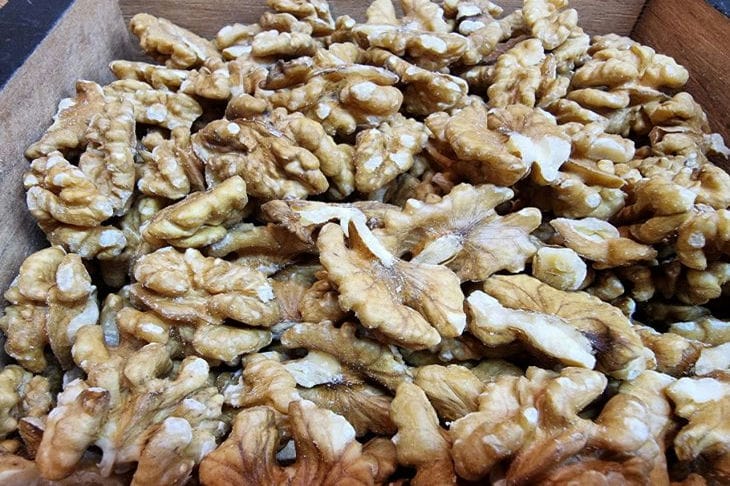Walnut: from composition to selection and storage – facts you didn’t know yet
Walnuts are highly valued for their pleasant taste. However, this is far from the main advantage of the product.
Walnut kernels are also rich in various biologically active substances that are very beneficial for our body.
Today we will talk about how regular consumption of walnuts can help improve your health.
What is a walnut made of?
Walnuts have been widely used in cooking and folk medicine for many centuries. Initially, they were supplied to the territory of Rus' by Greek dealers, and thanks to them the nut got its name.
Today, this product is most often brought to our country from the southern region of the Caucasus, China and the United States of America.

The popularity of walnuts as a health supplement is due to their unique composition.
The kernels contain the following biologically active substances:
• vitamins (A, group B, E, C, K, PP);
• minerals (potassium, calcium, sodium, magnesium, phosphorus, iron, zinc, manganese, iodine);
• amino acids (valine, cystine, asparagine, glutamine);
• polyunsaturated fatty acids (oleic, linolenic).
In addition, walnuts are rich in essential oils, antioxidants and dietary fiber.
What are the benefits of walnuts?
Thanks to all these substances, walnuts are very useful for health. They improve the functioning of many organs and systems.
Central and peripheral nervous system. Externally, the walnut kernel resembles the brain. Perhaps nature created this analogy for a reason.
With regular use, walnuts improve the transmission of impulses along nerve fibers, stimulate brain function, improve memory and concentration, stabilize mood and help combat the effects of stress and intense mental work.
Musculoskeletal system. Minerals and other useful substances contained in walnuts strengthen bone tissue and also have an anti-inflammatory effect, which is especially important for various joint diseases.
Gastrointestinal tract. Walnut kernels are rich in fiber, which improves digestion and helps rid the body of toxins.
Hematopoietic system. Iron and other minerals found in walnuts reduce the risk of anemia.
Cardiovascular system. Regular consumption of walnuts strengthens the walls of blood vessels and the heart muscle, normalizes blood pressure. In addition, this product lowers the level of cholesterol in the blood, which significantly reduces the likelihood of atherosclerosis.
Thyroid gland. Walnuts are rich in iodine, which normalizes the thyroid gland and prevents the occurrence of various pathologies of this organ.
Reproductive system. Walnuts have a positive effect on both the female and male reproductive systems. In men, this product reduces the risk of impotence and prostate adenoma. In women, it normalizes hormonal levels, helps the body recover after heavy menstruation, and also reduces the risk of cancer, including breast cancer.
As you can see, the beneficial properties of walnuts are hard to overestimate. By the way, this product also improves the general condition of the body, increases efficiency and perfectly satisfies hunger.
Harm of walnuts
Despite all the healing properties, in some cases, eating walnuts can be harmful to health. This product should be excluded from the diet in the following diseases listed below.
Excess weight. Walnuts are very high in calories, so doctors recommend first normalizing your weight and only then including this product in your menu.
Allergic reaction. Individual intolerance can be caused by any food product, and walnuts are no exception. If you have a tendency to allergies, all nuts should be consumed with great caution, as even a small piece can cause a strong reaction of the body, up to anaphylactic shock.
Blood coagulation system disorders. Walnuts are contraindicated for those who may develop blood clots. This product contains a lot of protein and calcium, which stimulate the production of fibrin and increase the rate of thrombus formation.
Intestinal disorders and inflammatory processes in the pancreas. Walnuts are considered heavy food, so during periods of exacerbation of digestive tract diseases, you should refrain from them.
By the way, even in the absence of the above-mentioned ailments, walnuts can be dangerous. We are talking about low-quality and stale fruits. Even a healthy person should not eat them.
Selection and storage
Choosing a quality product in a store is an important but not difficult task. You just need to follow some recommendations.
If you buy walnuts in shell, make sure that there are no cracks, chips, dents or other damage. It is also important that the shell has a uniform color without spots or other defects.
Try the nuts in their shells by weight. Old nuts are lighter than fresh ones.
You can determine the freshness of a nut by shaking it. Old, dried kernels will hit the shell walls with a characteristic knock. In fresh fruits, the nut is held tightly, so you will not hear the sound.
When buying peeled walnuts, look at the color of the kernels: it should be light.
Smell the kernels: the fresh product has a slight nutty aroma. You should not notice any unpleasant odors.
If possible, taste the nut. It should not be salty or rancid.
If you plan to store walnuts for a long time, it is better to buy them in the shell. It is enough to put them in a cloth bag and leave them in a cool, ventilated place. The nuts will retain their properties for a year.
Peeled kernels can be stored for up to two months. It is best to place them in an airtight container and put them in the refrigerator or freezer. Peeled nuts can also be stored in cloth bags, but before that, the kernels need to be dried in the oven for an hour.
We will probably stop here and wish you success in all your good endeavors and, of course, the best of health.
Earlier we talked about why pancakes rise but quickly fall.
